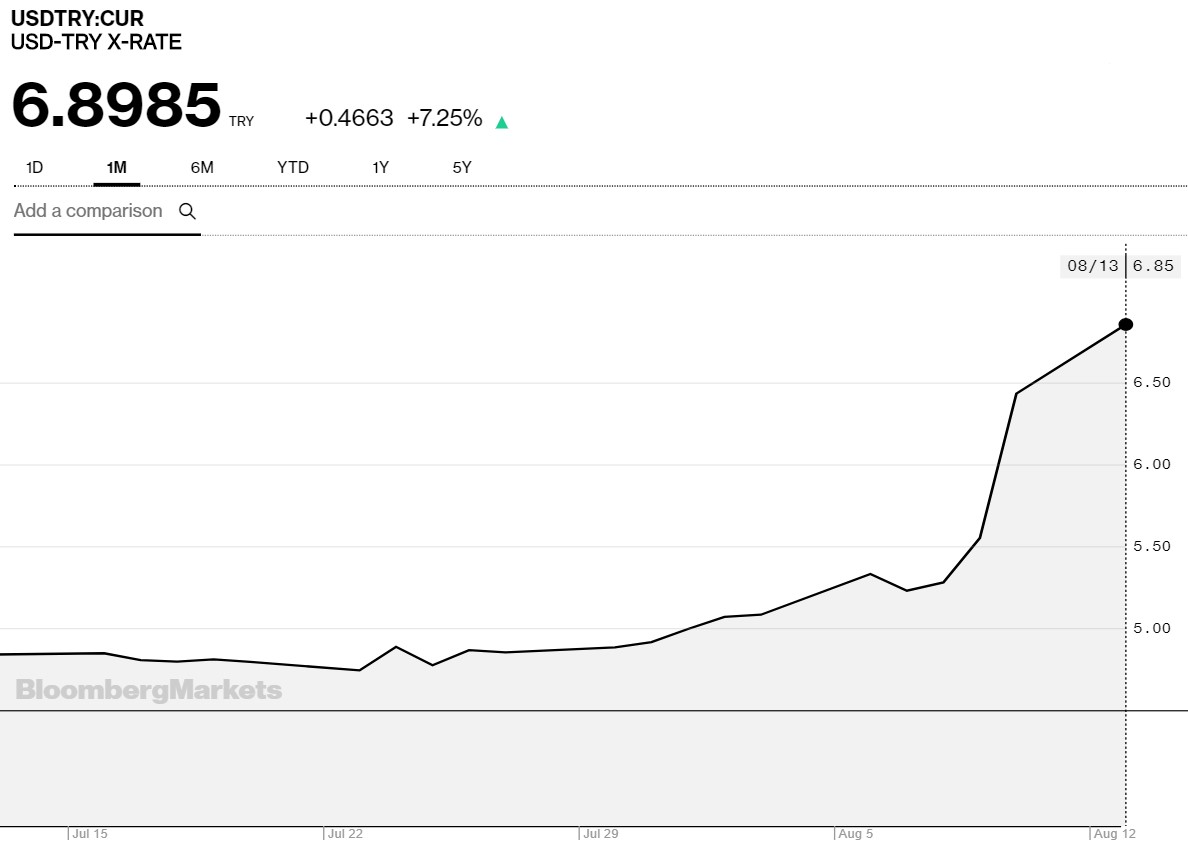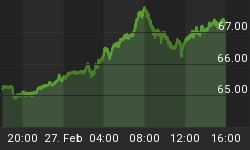Monday, August 13, 2018
Week opens with market volatility. Stock markets started the week down on financial volatility. The currency turmoil in Turkey has led to jitters across financial markets. Japan’s Nikkei closed down 2 percent and Hong Kong’s Hang Seng was down 1.5 percent. The DAX in Germany and the UK’s FTSE both opened lower. “Turkey’s problems are quite idiosyncratic and should be relatively well-contained outside of the obvious short-term risk-off unless there’s a major investor retrenchment from EM generally,” according to Deutsche Bank.
Chart of the Week

(Click to enlarge)
- Turkey’s currency, the lira, has declined by more than 30 percent in less than a week, a catastrophic meltdown that is threatening to spread to other emerging markets. The currency is down nearly 50 percent since the beginning of August.
- The problem could contribute to the decline of other currencies.
- A rout in emerging market currencies could depress demand in those countries, as everything from copper, to agricultural goods to oil and natural gas become more expensive.
Markets
Turkey curtailed trading of lira. Late Sunday night, Turkey’s bank regulator limited the ability of Turkish banks to trade lira for foreign currencies, a move intended to halt the crash in the country’s currency. Last week, the U.S. announced a hike in steel and aluminum tariffs on Turkey, which set off a downward spiral in the lira. Market watchers are nervous that Turkey’s sudden crisis could spread to other markets, setting off an economic contagion that would be hard to rein in.
China weakens currency again. On Monday, China allowed the yuan to weaken by 0.34 percent, another dip in the currency that has the yuan trading at its weakest point in 15 months. China’s currency is now down 9 percent to the dollar since April, hit by a slowing Chinese economy, rate tightening from the U.S. Federal Reserve, and fears about the escalating trade war. The slide in the yuan is indicative of the pressure emerging market currencies have faced this year amid slowing growth and the strength of the U.S. dollar. India’s rupee and Indonesia’s rupiah also fell to multi-year lows against the dollar.
Related: Wells Fargo Rocked By Another Major Scandal
U.S. and EU make progress on trade deal. The U.S. State Department has reportedly sent a cable to its diplomats across Europe, asking for areas of business ripe for lowering of tariffs or cutting of regulations, according to CNBC. There was a particular emphasis on U.S. energy and soybean exports. The request comes two weeks after the U.S. and EU tentatively agreed to move forward on lowering trade restrictions and there are some signs that the two sides are making some modest progress.
Commodities
Copper prices fall again. Copper prices fell on Monday as the U.S. dollar strengthened to a 13-month high against the euro. The financial contagion sparked by the Turkish currency crisis seemed to seep into commodity markets. Three-month copper prices on the London Metal Exchange was down 0.8 percent. Meanwhile, a major strike at a copper mine in Chile seems imminent, but labor unrest has so far failed to rescue prices.
Gold dips. The dollar strength in addition to the Turkish lira crisis are causing havoc in currency markets, so understandably gold dipped on Monday. But in euro terms, gold prices have held up much better. CFTC data shows that investors have once again cut their net length in gold futures, extending a selloff in futures that has unfolded over most of 2018.
Record crop for corn and soybeans. U.S. corn yields are expected to be the third largest of all time, and government data has been revised up recently by 9 million tons compared to July’s estimate. But there are smaller-than-expected crops elsewhere, including in the EU and Brazil. Corn prices fell by 3 percent on Friday on the news of a strong U.S. crop, and soybean prices fell by 4.7 percent.
Energy
Frackers burn cash. 2018 is supposed to be the year that the U.S. shale industry collectively posts a profit, essentially for the first time in its history. However, roughly two-thirds of U.S. oil producers posted negative cash flow in the second quarter. The Wall Street Journal reports, using data from FactSet, that 50 major U.S. oil companies spent $2 billion more than they earned in the second quarter.
Chinese companies could halt U.S. crude oil and LNG purchases. Last week, China declined to include U.S. crude oil and LNG on its list of retaliatory tariffs, but Chinese state-owned energy companies are cutting purchases anyway. PetroChina, a subsidiary of CNPC, may cease purchases of spot U.S. LNG through the winter as the possibility of tariffs loom. That could lead to higher LNG spot prices in East Asia this winter as China looks for alternatives. Meanwhile, Chinese companies are also reducing their purchases of U.S. crude oil. “We have received our August WTI delivery and will not take any US cargoes in coming months, while Unipec has not offered us any US crude either,” an executive from a central Sinopec refinery in central China told S&P Global Platts.
Related: Time To Buy A Lada? Russian Auto Sales Are Booming
OPEC production edges up only slightly in July. OPEC production in July rose by a modest 40,000 bpd. Saudi Arabia cut output by 52,000 bpd, according to analysts, although Riyadh reported a decline of 200,000 bpd. The discrepancy has puzzled analysts, raising questions about Saudi intentions. Meanwhile, output fell in Venezuela (-47,700 bpd), Iran (-56,300 bpd) and Libya (-56,700 bpd). Those losses were offset by increases in the Kuwait (+78,500 bpd), Nigeria (+70,500 bpd), the UAE (69,200 bpd) and Iraq (+24,100 bpd). The collective increase of 40,000 bpd was lower than the market had previously expected, based on the results of the June OPEC+ deal, which promised output increases of around 1 mb/d.
Cryptocurrencies
Bitcoin speculators dominate trading, not illegal activity. Contrary to the somewhat outdated notion of Bitcoin primarily being used for illicit activities, such as drug trafficking, the overwhelming concentration of activity in the digital currency is conducted by speculators. That comes from a top official at the U.S. DEA. Bitcoin is still used in illicit activities, but the currency has also emerged as a legitimate financial asset, giving rise to speculative trading that now dwarfs the use of Bitcoin for illegal activity. “The volume has grown tremendously, the amount of transactions and the dollar value has grown tremendously over the years in criminal activity, but the ratio has decreased,” Lilita Infante, a DEA agent and member of a special task force on cyber investigations, told Bloomberg. “The majority of transactions are used for price speculation.”
Turkish lira volatility makes Bitcoin look stable. Bitcoin and other cryptocurrencies have been ravaged by volatility over the past two years, but the latest crash in Turkey’s currency makes digital currencies look relatively stable by comparison. Bloomberg notes that the 10-day swings in the lira exceed those of Bitcoin.
Bitcoin prices hold firm. After falling back from a recent peak in late July at over $8,000, Bitcoin is holding the line against another downturn. Prices firmed up at just over $6,000 last week, regaining some strength after a nearly three-week swoon. The technical signs open up Bitcoin to a further corrective rally now that the bearish break was dashed.
By Josh Owens for Safehaven.com
More Top Reads From Safehaven.com
















